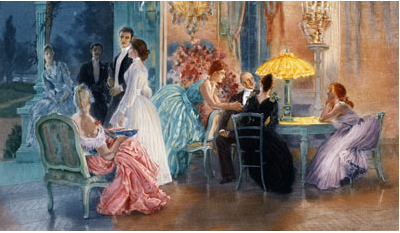
SIR ISAIAH BERLIN, a Latvian-born Oxford philosopher who died in 1997, may well have ranked among the greatest conversationalists who ever lived. According to Robert Darnton, a Princeton historian, Berlin's friends would "watch him as if he were a trapeze artist, soaring through every imaginable subject, spinning, flipping, hanging by his heels and without a touch of showmanship". Darnton reckoned that Berlin's only match in relatively modern times might have been Denis Diderot, an 18th-century French Enlightenment philosopher. By one account Diderot's conversation was "enlivened by absolute sincerity, subtle without obscurity, varied in its forms, dazzling in its flights of imagination, fertile in ideas and in its capacity to inspire ideas in others. One let oneself drift along with it for hours at a time, as if one were gliding down a fresh and limpid river, whose banks were adorned with rich estates and beautiful houses."
出生于拉脫維亞,辭世于1997年的牛津哲學(xué)家ISAIAH BERLIN爵士足可躋身于世間曾有的最偉大的健談人士之列。據(jù)普林斯頓大學(xué)歷史學(xué)家Robert Darnton稱,Berlin的朋友們會(huì)"注視著他就像看著一位高空雜技藝術(shù)家——他從你想象得到的每一個(gè)道具中猛然穿越而過,靠一雙腳跟旋轉(zhuǎn)著,彈跳著,懸掛著,而你卻對(duì)他表演能力毫無察覺"。 Darnton認(rèn)為,在相對(duì)當(dāng)代時(shí)間內(nèi),唯一可以與Berlin媲美的是18世紀(jì)的法國(guó)啟蒙哲學(xué)家狄德羅(Denis Diderot)。據(jù)說,狄德羅的談吐的特點(diǎn)是"因極致的真誠(chéng)而來的生動(dòng)活潑,機(jī)巧而不含糊,形式多有變化,想象力奇妙得令人驚羨,觀點(diǎn)豐富,其內(nèi)涵足以激發(fā)他人的觀點(diǎn)。他的談吐,能讓人一次隨之游蕩上數(shù)個(gè)小時(shí),仿佛隨著清澈而明凈的河水飄搖而下,兩岸河邊點(diǎn)綴著富氣的洋房和美麗的宅院。"
Churchill was another magnificent talker, perhaps the greatest of the 20th century, but often a poor listener. Virginia Woolf was given, in the words of one biographer, to "wonderful performances in conversation, spinning off into fantastic fabrications while everyone sat around and, as it were, applauded". A short list of the greatest living conversationalists in English would probably have to include Christopher Hitchens, Sir Patrick Leigh Fermor, Sir Tom Stoppard, Studs Terkel and Gore Vidal.
丘吉爾(Churchill)是另一位豪氣干云的健談家,他也許還是20世紀(jì)最偉大的健談家,但他常常是個(gè)糟糕的傾聽者。在一本傳記中,弗吉尼亞·伍爾芙(Virginia Woolf)被寫描寫成:"交談時(shí)的表現(xiàn)非凡,在仿佛受人稱道似的被大家圍坐一旁時(shí),他說起來了就像是穿針引線,織布成錦。"如果拉出一個(gè)尚且健存在世的最偉大的英語健談家的簡(jiǎn)短名單話,大概一定要囊括上Christopher Hitchens,Patrick Leigh Fermor爵士, Tom Stoppard爵士, Studs Terkel和Gore Vidal這幾位了。
Great brilliance, fantastic powers of recall and quick wit are clearly valuable in sustaining conversation at these cosmic levels. Charm may be helpful too—although Samuel Johnson, one of the most admired conversationalists of 18th-century England, seemed to manage without much of it. For those of more modest accomplishments, but attached to conversation as one of life's pleasures and necessary skills, there is a lively market in manuals and tip-sheets going back almost 500 years, and a legacy of wisdom with an even longer history. One striking thing about the advice is how consistent it remains over time, suggesting that there are real rights and wrongs in conversation, not just local conventions.
在這些普適用水平上,橫溢的才華、非凡出色的回憶能力和急智,這些都對(duì)支持談吐都有明確的價(jià)值。魅力也能多少的增色添香——盡管18世紀(jì)英格蘭最令人欽佩的交談高手Samuel Johnson在這一點(diǎn)上并粘到多少光也能得心應(yīng)手。對(duì)于那些更為適宜的教養(yǎng),除了作為人一生的樂趣和必需技能而依附于談吐之上,還有一個(gè)可以追溯至近500年前的、存在于手冊(cè)和小竅門折頁的鮮活的市場(chǎng)和一份甚至歷史更悠久的智慧遺產(chǎn)。"超時(shí)的剩余部分有多大的一致性" 這樣一個(gè)有關(guān)建議所突出的事宜,提示談吐中確實(shí)有對(duì)有錯(cuò),而不僅僅只是本土習(xí)俗。
The principle that it is rude to interrupt another speaker goes back at least to Cicero, writing in 44BC, who said that good conversation required "alternation" among participants. In his essay "On Duties", Cicero remarked that nobody, to his knowledge, had yet set down the rules for ordinary conversation, though many had done so for public speaking. He had a shot at it himself, and quickly arrived at the sort of list that self-help authors have been echoing ever since. The rules we learn from Cicero are these: speak clearly; speak easily but not too much, especially when others want their turn; do not interrupt; be courteous; deal seriously with serious matters and gracefully with lighter ones; never criticise people behind their backs; stick to subjects of general interest; do not talk about yourself; and, above all, never lose your temper.
"打斷別的發(fā)言人的講話是粗俗魯莽的" 的這一原則這至少可以追溯至公元前44年,西塞羅(Cicero)所寫的文字。他說,良好的交談需要參與者之間的"輪轉(zhuǎn)"。其著作《論責(zé)任》中,西塞羅談?wù)摰剑瑩?jù)他所知,已經(jīng)有人為日常會(huì)話制定出了規(guī)則,盡管許多人作公共講演時(shí)也施行這些規(guī)則。他自己據(jù)此而行,飛快躋身到了某種"自學(xué)的作品引起了從未有過的回應(yīng)"的名單之上。從西塞羅這可以學(xué)到的這些規(guī)則有:咬字清楚,通情達(dá)意;談吐自如,勿要贅言敷敘,他人出語之刻,殊不可間語插話;知書達(dá)禮持;大事慎應(yīng),小事雅裁;戒以蜚短流長(zhǎng)、說項(xiàng)說莊;老調(diào)多彈,鄉(xiāng)俗常拾;(堅(jiān)持普羅大眾的感興趣的話題);勿要自是自彰,自矜自夸。諸般之上,萬不可易色改容,失性發(fā)狂(而在所以這些之上的則是絕不發(fā)火發(fā)飆。)
Probably only two cardinal rules were lacking from Cicero's list: remember people's names, and be a good listener. Each of these pieces of advice also has a long pedigree. At a pinch you might trace the point about names back to Plato. Both found a persuasive modern advocate in Dale Carnegie, a teacher of public speaking who decided in 1936 that Americans needed educating more broadly in "the fine art of getting along". His book "How to Win Friends and Influence People" is still in print 70 years later and has sold 15m copies. To remember names, and to listen well, are two of Carnegie's "six ways to make people like you". The others are to become genuinely interested in other people; smile; talk in terms of the other person's interests; and make the other person feel important.
西塞羅的單子上也許只少了2個(gè)關(guān)鍵性的規(guī)則:記住人們的名字,成為好的傾聽者。這些建議的吉光片羽都源遠(yuǎn)流長(zhǎng)。尋幽探微的話,追溯起來可以找到柏拉圖的名字。兩者都在能言善道的時(shí)髦鼓吹手Dale Carnegie身上中找得到。作為教授公開演講的老師,他在1936年斷言,美國(guó)人需要進(jìn)行更為寬泛的"相處的現(xiàn)代藝術(shù)"教育。其著作《如何贏得朋友和影響他人》在之后的70年里一直還在印刷出版,售賣了1500萬本。記住姓名,進(jìn)行良好的傾聽,是Carnegie的"讓別人喜歡上你的6個(gè)辦法"中的2個(gè)。其他的幾個(gè)是:發(fā)自內(nèi)心的關(guān)注他人、微笑、用別人感興趣的腔調(diào)說話、讓他/她覺得自己很重要。
Cicero's rules of conversation seem to have been fairly common across cultures as well as time, if varying in strictness. It might reasonably be said that Italians are more tolerant of interruption, Americans of contradiction and the English of formality, for example. These rules of conversation also intersect with those of politeness more generally, as formulated by two American linguists, Penelope Brown and Steven Levinson, the pioneers of "politeness theory".
西塞羅的談話原則在不同文化不同時(shí)代里都是適用的,只不過側(cè)重點(diǎn)不一樣(對(duì)各項(xiàng)原則的要求嚴(yán)格程度并不一樣)。比如說,意大利人更能忍受被人打斷,美國(guó)人忍受自相矛盾,英國(guó)人忍受拘謹(jǐn)俗套,這些都是合乎情理的。正如由作為"禮貌理論"的先鋒的2位美國(guó)語言學(xué)家Penelope Brown和Steven Levinson所系統(tǒng)化表達(dá)的那樣,這些規(guī)則更為普遍的與禮貌互相作用。












